Related Research Articles
Surf music is a genre of rock music associated with surf culture, particularly as found in Southern California. It was especially popular from 1958 to 1964 in two major forms. The first is instrumental surf, distinguished by reverb-heavy electric guitars played to evoke the sound of crashing waves, largely pioneered by Dick Dale and the Del-Tones. The second is vocal surf, which took elements of the original surf sound and added vocal harmonies, a movement led by the Beach Boys.

The Ventures are an American instrumental rock band formed in Tacoma, Washington, in 1958, by Don Wilson and Bob Bogle. The band, which was a quartet for most of its existence, helped to popularize the electric guitar across the world during the 1960s. While their popularity in the United States waned in the 1970s, the group remains especially revered in Japan, where they have toured regularly. The classic lineup of the band consisted of Wilson, Bogle, Nokie Edwards, and Mel Taylor (drums).
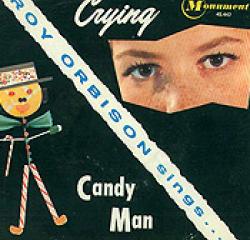
"Crying" is a song written by Roy Orbison and Joe Melson for Orbison's third studio album of the same name (1962). Released in 1961, it was a number 2 hit in the US for Orbison and was covered in 1978 by Don McLean, whose version went to number 1 in the UK in 1980.

Bob Loyce Moore was an American session musician, orchestra leader, and double bassist who was a member of the Nashville A-Team during the 1950s and 1960s. He performed on over 17,000 documented recording sessions, backing popular acts such as Elvis Presley and Roy Orbison. Bob was also the father of multi-instrumentalist R. Stevie Moore, who pioneered lo-fi/DIY music. The New York Times called him "an architect of the Nashville Sound of the 1950s and '60s" in his obituary.

"Runaway" is a number-one Billboard Hot 100 song made famous by Del Shannon in 1961. It was written by Shannon and keyboardist Max Crook, and became a major international hit. It topped the Billboard charts for four consecutive weeks, and Billboard ranked it as the No. 5 song for 1961. It was No. 472 on the 2010 version of Rolling Stone's list of the 500 Greatest Songs of All Time and No. 466 on the 2004 version.
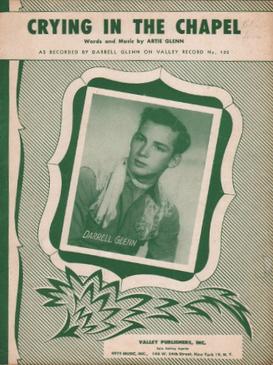
"Crying in the Chapel" is a song written by Artie Glenn and recorded by his son Darrell Glenn. The song was released in 1953 and reached number six on the Billboard chart.
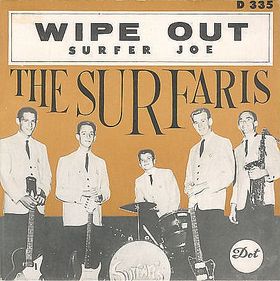
"Wipe Out" is a surf music instrumental composed by Bob Berryhill, Pat Connolly, Jim Fuller and Ron Wilson. Composed in the form of twelve-bar blues, the tune was first performed and recorded by the Surfaris, who became famous with the single in 1963.
"Desafinado" is a 1959 bossa nova song and jazz standard composed by Antônio Carlos Jobim with lyrics by Newton Mendonça.
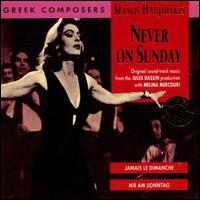
"Never on Sunday", also known by its original Greek title "Ta Pediá tou Pireá", is a song written by Manos Hatzidakis and first sung by Melina Mercouri in the film of the same name, directed by Jules Dassin and starring Mercouri. The song won the Academy Award for Best Original Song in 1960, a first for a foreign-language picture. The film score was first released on 1 October 1960 by United Artists Records.
"Calcutta" is a German pop song. An instrumental version by American bandleader and TV host Lawrence Welk on the 1961 Dot Records album Calcutta! was a Number One song in the United States, and the most successful hit of Welk's career.

"Under the Boardwalk" is a pop song written by Kenny Young and Arthur Resnick and recorded by the Drifters in 1964. It charted at number four on the Billboard Hot 100 chart on August 22, 1964. The song has since been covered by many other artists, with versions by Bette Midler, Sam & Dave, Tom Tom Club, The Rolling Stones, Billy Joe Royal, The Beach Boys, Bruce Willis, Bad Boys Blue, John Mellencamp and Lynn Anderson all charting in the United States or overseas. The song ranked number 487 on Rolling Stone's list of The 500 Greatest Songs of All Time in 2004 and number 489 in 2010.
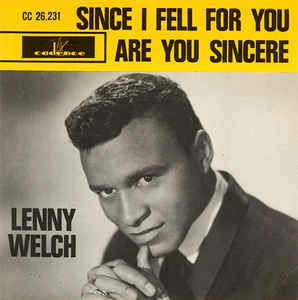
"Since I Fell for You" is a blues ballad composed by Buddy Johnson in 1945 that was first popularized by his sister, Ella Johnson, with Buddy Johnson and His Orchestra.

"Mr. Lonely" is a song co-written and recorded by American singer Bobby Vinton, backed by Robert Mersey and his Orchestra. The song was first released on Vinton's 1962 album, Roses Are Red.
The discography of Buck Owens, an American country music artist, consists of 39 studio albums, 16 compilation albums, 9 live albums, 97 singles, and 12 B-sides. After recording under the name Corky Jones and releasing a string of singles in the mid-1950s, Owens signed a recording contract with Capitol Records in February 1957.
Billboard Top Pop Hits is a series of compilation albums released by Rhino Records in 1994 and 1995, each featuring ten recordings from the easy listening charts from a specific year in the 1960s. Ten albums in the series were released, one each for the years from 1960 to 1969.

"Then You Can Tell Me Goodbye" is a song written by John D. Loudermilk. It was first released in 1962 by Don Cherry, as a country song and again as a doo-wop in 1967 by the group The Casinos on its album of the same name, and was a number 6 pop hit that year. The song has since been covered by Eddy Arnold, whose version was a number 1 country hit in 1968, and by Neal McCoy, whose version became a Top 5 country hit in 1996.

"I Love You So Much It Hurts" is a song written and recorded by Floyd Tillman in 1948. His version reached number 6 on the Folk Best Seller charts and spent a total of nineteen weeks on the chart.
"Walking the Floor Over You" is a country music song written by Ernest Tubb, recorded on April 26, 1941 in Fort Worth, Texas, and released in the United States that year.
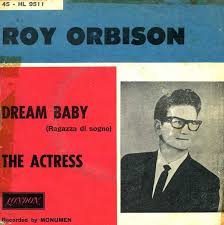
"Dream Baby (How Long Must I Dream)" is a song written by Cindy Walker which was first recorded and released by Roy Orbison originally as a non-album single in 1962. It was a big international hit for Orbison, reaching number 2 in both the Australian and the UK singles charts and number 4 in the U.S. Billboard. It was also a top ten hit in Canada and Norway. Five months later, "Dream Baby" was included on Orbison's Greatest Hits compilation LP.
"Lonely Street" is a 1956 song written by Carl Belew, Kenny Sowder, and W.S. Stevenson, originally performed by Belew, and later by Dave Rich.
References
- ↑ Whitburn, Joel (1996). The Billboard Book of Top 40 Hits, 6th Edition (Billboard Publications)
- ↑ Bob Moore biography at www.nashvillesound.net
- ↑ "www.allmusic.com". allmusic.com. Retrieved July 4, 2023.
- ↑ "www.allmusic.com". allmusic.com. Retrieved July 4, 2023.
- ↑ "www.allmusic.com". allmusic.com. Retrieved July 4, 2023.